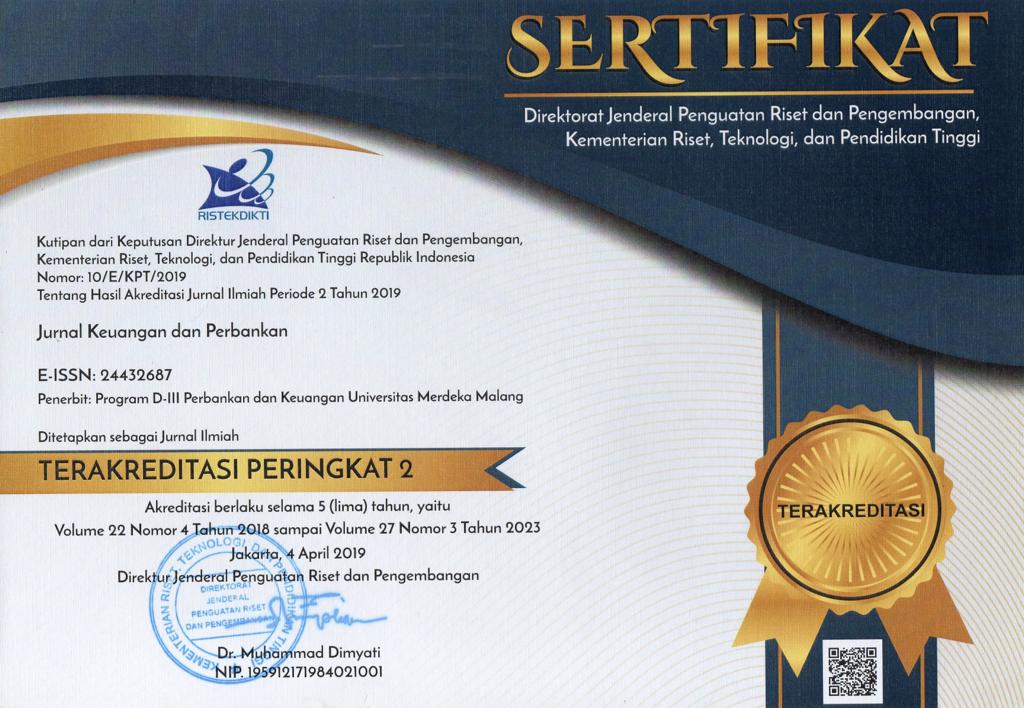THE EFFECT OF TAX SIMPLIFICATION ON TAXPAYERS’ COMPLIANCE BEHAVIOR: RELIGIOSITY AS MODERATING VARIABLE
Abstract
meet public needs. The importance of tax simplification had long been known as a determinant of compliance
behavior and it became an important issue in taxation research. The primary objective of this study was to
investigate the effect of tax simplification and religiosity on compliance behavior. This study was conducted in
Malang, East Java. Survey questionnaires were sent to 200 taxpayers and only 122 responded. Consistent
with the prior research, this study suggested that the effect of religiosity on compliance behavior was positive
and significant. Religiosity acted as moderating role on the relationship between tax simplification and
compliance behavior. This study was contributed to the compliance literature. The present study also provided
practical significance because the empirical result provided information about compliance behavior to help
government to develop strategies toward increasing voluntary compliance.
Keywords
Full Text:
pdfReferences
Al–Mamun, A., Entebang, H., Mansor, S.A., Yasser, Q.R., & Nathan, T.M., 2014. The Impact of Demographic Factors on Tax Compliance Attitude and Behavior in Malaysia. Journal of Finance, Accounting, and Management, 5(1): 109-124.
Alon, A. & Hageman, A.M. 2013. The Impact of Corruption on Firm Tax Compliance in Transition Economies: Whom Do You Trust? Journal of Business Ethics, 116(13): 479-494.
Avants, S.K., Marcotte, D., Arnold, R., & Margolin, A. 2003. Spiritual Beliefs, World Assumptions, and HIV Risk Behavior Among Heroin and Cocaine Users. Psychology of Addictive Behaviors, 17(2): 159–162.
Babakus, E., Cornwell, T.B., Mitchell, V., & Schlegelmilch, B. 2004. Reactions to Unethical Consumer Behavior across Six Countries. Journal of Consumer Marketing, 21(4): 254–263.
Bobek, D.D. & Hatfield, R.C. 2003. An Investigation of the Theory of Planned Behavior and the Role of Moral Obligation in Tax Compliance. Behavioral Research in Accounting, 15(1): 13-38.
Braithwaite, V. 2009. Defiance in Taxation and Governance: Resisting and Dismissing Authority in a Democracy. Cheltenham: Edward Elgar.
Brown, R.E. & Mazur, M.J. 2003. IRS’s Comprehensive Approach to Compliance Measurement. IRS White Paper. Internal Revenue Service Washington D.C.
Chan, K.H. & Mo, P.L.L. 2002. The Impact of Firm Characteristisc on Book-Tax-Conforming and Book-Tax-Difference Audit Adjustments. The Journal of the American Taxation Association, 24(2): 18-34.
Chamberlain, K. & Zika, S. 1992. Religiosity, Meaning in Life, and Psychological Well Being. In Religion and Mental Health Edition G. F. Schumacker. Oxford: Oxford University Press.
Cooper, G.S. 1993. Themes and Issues in Tax Simplification. Australian Tax Forum, 10(3): 417-460.
Cornwell, B., Cui, C.C., Mitchell, V., Schlegelmilch, B., Dzulkiflee, A., & Chan, J. 2005. A Cross-Cultural Study of the Role of Religion in Consumers’ Ethical Positions. International Marketing Review, 22(5): 531–546.
Cox, S.P. &Eger, R.J. 2006. Procedural Complexity of Tax Administration: The Road Fund Case. Journal of Public Budgeting, Accounting, and Financial Management, 18(3): 259-283.
Delener, N. 1990. An Examination of the Religious Influences as Predictors of Consumer Innovativeness. Journal of Midwest Marketing, 5(3): 167-178.
Delener, N. 1994. Religious Contrasts in Consumer Decision Behavior Patterns: Their Dimensions and Marketing Implications. European Journal of Marketing, 28(5): 36-53.
Essoo, N. & Dibb, S. 2004. Religious Influences on Shopping Behavior: an Exploratory Study. Journal of Marketing Management, 20(7-8): 683-712.
Fam, K.S., Waller, D.S., & Erdogan, B.Z. 2004. The Influence of Religion on Attitudes Towards the Advertising of Controversial Products. European Journal of Marketing, 38(5/6): 537-55.
Foxall, G. & Goldsmith, R. 1994. Consumer Psychology for Marketing. London: Routledge.
Ger, G. 2005. Religious Material culture: Modernity and Aesthetics, Special Session Summary. Advances in Consumer Research, 32: 79-81.
Long, S.B. & Swingen, J.A. 1987. An Approach to the Measurement of Tax Law Complexity. The Journal of the American Taxation Association, 8(2): 22–36.
McCullough, M.E. & Willoughby, B.L. 2009. Religion, Self-Regulation, and Self-Control: Associations, Explanations, and Implications. American Psychological Association, 135(1): 69-93.
McDaniel, S.W. & Burnett, J.J. 1990. Consumer Religiosity and Retail Store Evaluative Criteria. Journal of the Academy of Marketing Science, 18(2): 102-112.
Mohklis, S. 2006. The Influence of Religion on Retail Patronage Behavior in Malaysia. Doctoral Dissertation. University of Stirling.
Mohklis. 2009. Relevancy and Measurement of Religiosity in Consumer Behavior Research. International Business Research, 2(3): 75-84.
Mukhtar, A. & Butt, M.M. 2012. Intention to Choose Halal Products: The Role of Religiosity. Journal of Islamic Marketing, 3(2): 108-120.
Palil, M.R., Akir, M.R.M., Ahmad, W.F.B.W. 2013. The Perception of Tax Payers on Tax Knowledge and Tax Education with Level of Tax Compliance: A Study the Influences of Religiosity. ASEAN Journal of Economics, Management, and Accounting, 1(1): 118-129.
Pope, J. & Mohdali, R. 2010. The Role of Religiosity in Tax Morale and Tax Compliance. Australian Tax Forum, 25(4): 565-596.
Richardson, G. 2006. The Impact of Tax Fairness Dimensions on Tax Compliance Behavior in an Asian Jurisdiction: The Case of Hong Kong. The International Tax Journal, 32(1): 29-42.
Richardson, G. 2008. The Relationship between Culture and Tax Evasion across Countries: Additional Evidence and Extensions. Journal of International Accounting, Auditing, and Taxation, 17(2): 67-78.
Shiotsugu, A.A. 2007. Complexity and Compliance of Partnership Taxation: A study of the Pass-Through Subchapter K Statute of the Internal Revenue Code. Dissertation. University of La Verne California.
Siahaan, F.O.P. 2012. The Influence of Tax Fairness and Communication on Voluntary Compliance: Trust as an Intervening Variable. International Journal of Business and Social Science, 3(21): 191-198.
Stack, S. & Kposowa, A. 2006. The Effect of Religiosity on Tax Fraud Acceptability: A Cross-National Analysis. Journal for the Scientific Study of Religion, 45(3): 325-351.
Tarjo. 2010. Complexity and Socialization of Taxation Rule in Affecting The Taxpayer Accounting Behavior In Indonesia. International Journal of Accounting and Business Society, 18(1): 55-69.
Tran-Nam, B., Evans, C., & Walpole, M., & Ritchie, K. 2002. Tax Compliance Costs: Research Methodology and Empirical Evidence from Australia. National Tax Journal, 53(2): 229-252.
Tran-Nam, B. 2004. Assessing the Tax Simplification Impact of Reform: Research Methodology and Empirical Evidence from Australia. Proceedings Annual Conference on Taxation, 97(4): 376-385.
Trivedi, V.U., Shehata, M., & Mestelman, S. 2005. Attitudes, Incentives, and Tax Compliance. Canadian Tax Journal, 53(1): 29-61.
Vadde, S. & Gundarapu, S. 2012. Factors that Influence Rental Tax Payers’ Compliance with Tax System: An Empirical Study of Mekelle City, Ethiopia. Journal of Arts, Science, and Commerce, 3(4):41-49.
Welch, M.R., Xu, Y., Bjarnason, T., Petee, T., O'Donnell, P., & Magro, P. 2005. But Everybody Does It: The Effects of Perceptions, Moral Pressures, and Informal Sanctions on Tax Cheating. Sociological Spectrum, 25(1): 21-52.
Westat, I. 1980. Individual Income Tax Compliance Factors Study Qualitative Research. Prepared for the Internal Revenue Service.
Worthington, E.L., Wade, N.G., Hight, T.L., McCullough, M.E., Berry, J.T., Ripley, J.S., Berry, J.W., Schmitt, M.M., & Bursley, K.H. 2003. The Religious Commitment Inventory-10: Development, Refinement, and Validation of a Brief Scale for Research and Counseling. Journal of Counseling Psychology, 50(1): 84-96.
Yankelovich, S. & White, I. 1984. Survey of Taxpayer Attitudes. Prepared for the Internal Revenue Service New York, December.
DOI: https://doi.org/10.26905/jkdp.v19i1.836
Refbacks
- There are currently no refbacks.
Jurnal Keuangan dan Perbankan (Journal of Finance and Banking)
Diploma Program of Banking and Finance, Faculty of Economics and Business, University of Merdeka Malang
Published by University of Merdeka Malang
Mailing Address:
2nd floor Finance and Banking Building, Jl. Terusan Raya Dieng No. 57 Malang, East Java, Indonesia
Phone: +62 813-3180-1534
Email: jkp@unmer.ac.id
 This work is licensed under a Creative
This work is licensed under a Creative
Commons Attribution-ShareAlike 4.0




